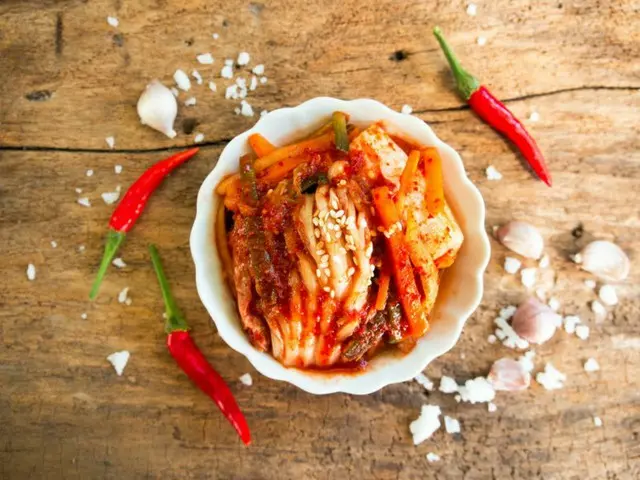The article reported that "Chinese cabbage is under threat from climate change. Researchers and Chinese cabbage growers say that rising temperatures are affecting the quality and yield of Chinese cabbage. In South Korea, if things continue as they are,
Some people are concerned that in the future, Korean cabbage kimchi may no longer be available. Kimchi is a Korean food. It is an indispensable vegetable on the dinner table, and is served with the main dish at restaurants.
In addition, the Korean household has a tradition of making kimchi with family and relatives in preparation for the winter when vegetables are no longer available.
Kimchi making is such a big winter event that the weather forecast announces the Kimchi front, which tells the best time to make kimchi. The Korea Agro-Fisheries and Food Trade Corporation website explains the history of Kimchi making,
According to this, although there is a description in the 1241 book "Dongguk Yi Sang-gukjip" of pickling radishes in salt to prepare for winter, it seems that the significance of this event as a major event was weak until around the 17th century.
The corporation explains that in the mid-18th century, nobles began making kimchi to survive the winter, and as this class of people began making kimchi at the same time each year, it led to kimjang.
As kimchi became popular among the upper classes, it soon spread to the common people, and with the popularity of Chinese cabbage kimchi, kimchi became a habit.
"The rise of the Korean people's social class is also one of the reasons why kimjang became so popular," he explains. In the 20th century, kimjang spread regardless of class and became established as a uniquely Korean culture.
Kimchi making has been registered as an intangible cultural heritage by UNESCO. However, due to urbanization and the trend towards nuclear families, opportunities to gather together with relatives to make kimchi are becoming less common.
Some have pointed out that the consumption of kimchi itself is on the decline. However, kimchi is an indispensable food for the Korean people, and as the "kingdom of kimchi," the country must protect the kimchi culture.
No Korean would disagree with this recognition. In 2007, the Korean Kimchi Association established November 22 as "Kimchi Day" in hopes of promoting the development of kimchi culture.
The reason for this is that kimchi is said to have 22 different (22) effects, each of which is made up of (11) individual ingredients. Also, Chinese cabbage, an ingredient in kimchi, is in season in November, and
It is also believed that this is the most suitable time for making kimchi. Next month, the traditional scene of "kimjang" will be seen all over Korea, but worrying news has been reported recently.
The price of vegetables, including Chinese cabbage, is rising due to the heatwave this summer. South Korea experienced record-breaking heat this summer, and the Korean newspaper JoongAng Ilbo analyzed temperature data from the Korea Meteorological Administration's open weather portal and found that
According to the results, the average temperature nationwide this summer (June to August) was 25.26 degrees, the highest since nationwide weather observations began in 1973. The average maximum temperature was 30.4 degrees.
This was the second highest temperature after the summer of 1994 (30.7 degrees). Chinese cabbage is said to be best grown at temperatures between 18 and 20 degrees, so this summer's heat has had a particularly large impact on Chinese cabbage among all vegetables.
It is said that soil-borne infectious diseases such as root rot, which causes the plants to wither and die, are spreading. There are also concerns that if the heatwaves continue every year, it may become impossible to eat Korean cabbage kimchi in the future.
Reuters pointed out that "cabbage kimchi is now under threat from climate change," and reported that "researchers, farmers and manufacturers say the quality and yield of cabbage is declining."
According to an article in Iter, a farmer of Chinese cabbage for kimchi who was interviewed said, "The high temperatures have caused an increase in soil diseases and viruses, and my cultivation area has been reduced by half."
According to the Rural Development Agency's climate change scenario, the area of land used for growing Chinese cabbage will continue to shrink, and by 2090 it will no longer be possible to grow it in highland areas.
Given that global warming is not being stopped, it will likely become necessary to develop varieties that can grow in warmer climates.
2024/10/09 15:23 KST
Copyrights(C)wowkorea.jp 5

